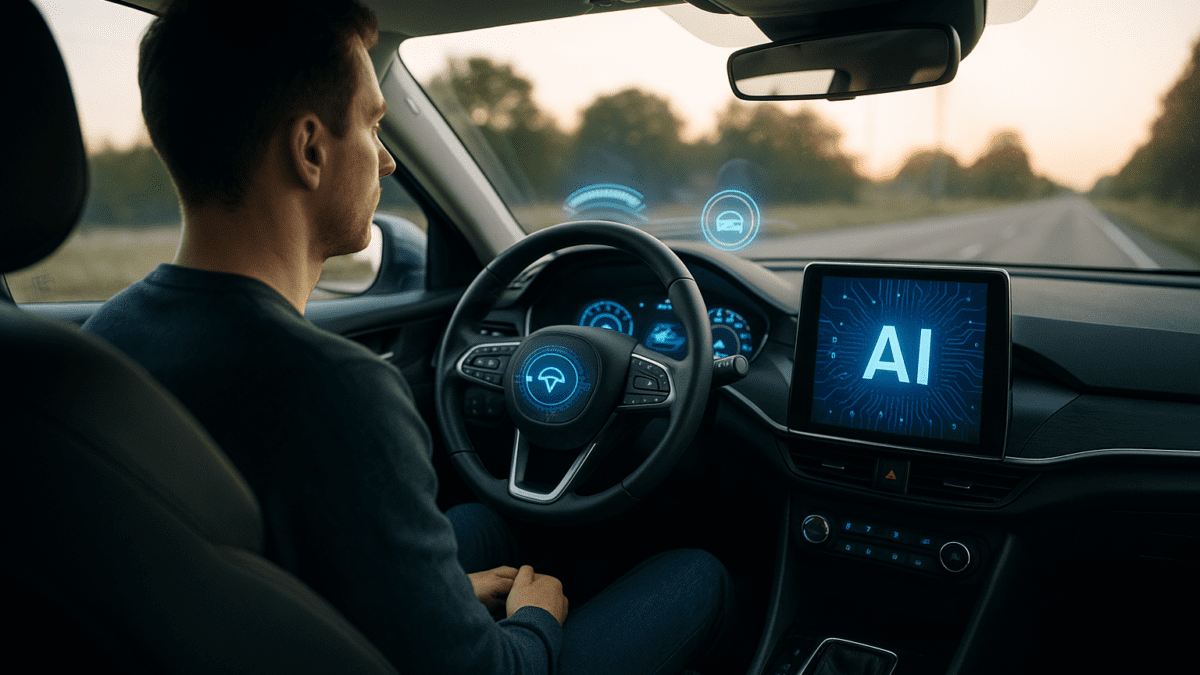AI in the Driver’s Seat: How Smart Software Is Redefining the Auto Industry
Table of Contents
Artificial Intelligence (AI) has moved from being a futuristic concept to a driving force behind innovation in nearly every industry. In the automotive sector, AI is no longer just about self-driving cars—it’s about redefining how vehicles are designed, manufactured, sold, and maintained.
In 2025, AI-powered smart software is reshaping the auto industry with safer vehicles, smarter customer experiences, and data-driven supply chains. Ignoring AI is not an option—automakers and suppliers who resist change may find themselves outpaced by AI-driven competitors.
The Role of AI in the Automotive Industry
AI technology impacts every stage of the automotive value chain, including:
- Design & Engineering: AI simulations optimize designs for performance, aerodynamics, and safety.
- Manufacturing: Predictive analytics streamline production lines and reduce downtime.
- Autonomous Driving: AI systems enable vehicles to perceive, analyze, and respond to their environment.
- Connected Cars: Intelligent software enhances navigation, infotainment, and predictive maintenance.
- Customer Experience: AI chatbots, recommendation engines, and virtual showrooms redefine how people buy cars.
Autonomous Vehicles: Beyond the Hype
The most high-profile use of AI in the auto industry is autonomous driving. While full self-driving adoption is still in progress, automakers are already deploying AI in:
- Driver assistance systems (lane detection, automatic braking, adaptive cruise control)
- Traffic prediction models for smoother journeys
- Vehicle-to-everything (V2X) communication to prevent accidents
Example: Tesla, Waymo, and traditional OEMs like GM are integrating AI algorithms that process millions of data points per second to make split-second driving decisions.
Smart Manufacturing: Efficiency on the Assembly Line
AI is transforming auto manufacturing into a smart, predictive ecosystem:
- Robotics & automation reduce human error and increase precision.
- Predictive maintenance minimizes downtime by forecasting equipment failures.
- Supply chain optimization ensures faster, more cost-efficient production.
Automakers can draw inspiration from strategies used in other industries. For instance, B2B marketers leverage content syndication to maximize efficiency—similar to how automakers apply AI to streamline operations.
Personalized Customer Experiences
AI goes beyond the factory—it also reshapes how consumers interact with brands and vehicles.
- AI-powered chatbots answer buyer queries instantly.
- Virtual showrooms offer immersive buying experiences.
- Predictive personalization recommends financing, upgrades, and services tailored to customer profiles.
According to McKinsey, AI-driven personalization can boost automotive sales conversions by up to 20%.
Predictive Maintenance: Smarter Vehicle Ownership
For drivers, one of the most practical AI benefits is predictive maintenance. Instead of waiting for breakdowns, AI-powered software analyzes sensor data to:
- Detect wear and tear early
- Schedule timely service alerts
- Lower maintenance costs
- Improve safety and reliability
This proactive approach builds trust between automakers and customers, ultimately enhancing brand loyalty.
Ethical & Regulatory Challenges
Despite its promise, AI in the auto industry faces hurdles:
- Data Privacy: Connected cars generate massive data that must be protected.
- Bias in Algorithms: AI decision-making must be fair and transparent.
- Regulatory Approval: Governments worldwide are still drafting frameworks for autonomous vehicles.
- Public Trust: Consumers remain cautious about safety and accountability.
For deeper insights, check out [EXTERNAL LINK HERE] exploring the intersection of AI and regulatory trends.
The Future of AI in the Auto Industry
Looking ahead, AI will accelerate innovations such as:
- Level 5 autonomy (full self-driving with zero human intervention)
- Vehicle-to-everything ecosystems that create smart cities
- AI-driven sustainability with optimized fuel usage and EV efficiency
- Digital twins for real-time simulation of vehicles and systems
- AI-powered insurance models that adjust premiums based on driving data
The auto industry is shifting from being product-focused to experience-focused, with AI at the center of this transformation.
Step-by-Step: How Automakers Can Embrace AI
- Invest in Data Infrastructure – Centralize data for analysis and scalability.
- Collaborate with Tech Partners – Build ecosystems with AI innovators.
- Focus on Ethics & Compliance – Establish frameworks for transparency.
- Upskill Workforce – Train employees to work alongside AI tools.
- Pilot & Scale – Start with smaller AI projects, then expand adoption.
Conclusion
AI is no longer just driving cars—it’s driving the future of the automotive industry. From autonomous vehicles to predictive maintenance and personalized customer journeys, smart software is setting new standards for safety, efficiency, and innovation.
For automakers, the key is to strike the right balance: embrace AI as a transformative partner while maintaining ethical, human-centered oversight.
Call-to-Action (CTA)
Want to stay ahead of the curve as AI reshapes the auto industry? Explore B2B content syndication services to amplify your brand’s voice in a data-driven world and connect with the right audience.





